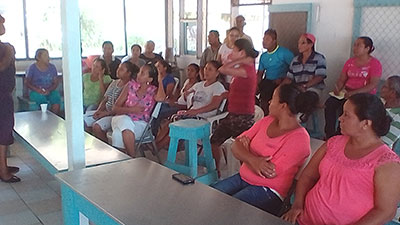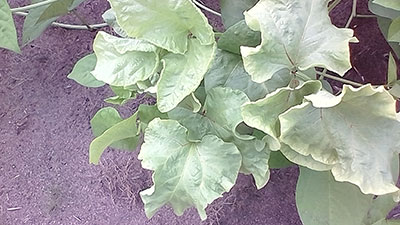IN THE coming months, the community of Orealla, on the Corentyne will be able to boost their village economy with the cultivation of peanuts that was introduced there last June, as part of a GY$5 million grant from the Government.
Over four acres of land was dedicated to the planting of the peanuts, which is a joint-initiative of 40 persons in the community. As part of the grant, the farmers were identified and given the opportunity to choose produce that will add to the livelihood of residents—the Guyana Jumbo peanuts were identified.
 Having recognised that the crop was new to the village, the National Agricultural Research and Extension Institute (NAREI), the Guyana Marketing Corporation (GMC) and Economics of Climate Adaptation (ECA) through the Ministry of Indigenous Peoples’ Affairs, offered an interactive training session to provide farmers with pertinent details regarding peanut cultivation. The objective of the training was to get members of the group to grow the Guyana Jumbo peanuts on large scale.
Having recognised that the crop was new to the village, the National Agricultural Research and Extension Institute (NAREI), the Guyana Marketing Corporation (GMC) and Economics of Climate Adaptation (ECA) through the Ministry of Indigenous Peoples’ Affairs, offered an interactive training session to provide farmers with pertinent details regarding peanut cultivation. The objective of the training was to get members of the group to grow the Guyana Jumbo peanuts on large scale.
Representatives of GMC provided the farmers with marketing tips while ECA’s staffers offered health and safety advice. NAREI’s Training Officer, Benjamin Frank, said that the training focused both on the theoretical and practical aspects of growing peanuts.
He explained that when NAREI visited the area, the group had already planted peanuts but were not exposed to basic training. It was observed that farmers were utilising the single-row planting system instead of the double or triple row system, which resulted in lesser plant density, thus reduced yields. Additionally, some of the planting materials were infected with Aspergillus fungi which resulted in poor or stunted growth and rotted crown tissues and roots. 
Farmers were advised not to de-shelled peanuts when storing and whether or not de-shelled nuts must be treated with a fungicide, for instance, Banrot. It was also observed that there was no buffer zone and as a result of this, bush can serve as a breeding ground for pest, which can attack the plants. In spots, fertilisers were placed in rows, rather than being placed on the side.
Thanks to the technical support, farmers are now informed about the good agricultural practices that could be incorporated to improve their planting for better results. Alice Peneux, a beneficiary of the training revealed that she was involved in farming for most of her life. The training, she indicated, has provided her with new knowledge about peanuts. She hopes to add peanuts to her existing line of cash crops.
She is not part of the group that received the grant but Peneux said that immediately after the training, she secured a plot of land from the Village Council. The excited Peneux started land clearing to plant peanuts which she intends to sell to the market.



.jpg)








